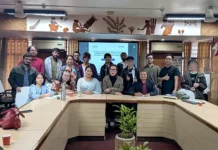Guwahati, Oct 8 (PTI) The Assam Cabinet on Tuesday expressed its gratitude to Prime Minister Narendra Modi for granting classical language status to Assamese.
It also approved the delimitation of panchayat areas and allocated over Rs 1,400 crore for the construction of rural roads and schools.
“Cabinet has adopted a resolution on behalf of Govt of Assam expressing gratitude to Hon’ble Prime Minister Shri Narendra Modi for giving Assamese the recognition of a ‘Classical Language’, honouring its rich heritage,” Chief Minister Himanta Biswa Sarma, who chaired the meeting, posted on X.
The inclusion of Assamese language in the list will aid in preservation, documentation and digitisation of ancient texts and general employment opportunities for local scholars, he added.
Sharing other key decisions taken at the Cabinet meet, the CM said it has approved the recommendations of the District Delimitation Commission on the proposed redrawing of gaon panchayats, anchalik panchayats, zilla parishad constituencies and proposed reorganisation of development blocks.
This delimitation will cover all districts except the Sixth Schedule areas of the state, he added.
The total number of gaon panchayats will be 2,193 in place of the existing 2,197.
There are 219 development blocks in the state, out of which 181 are under general areas and 38 under Sixth Scheduled Areas. The total number of blocks will remain the same after reorganisation, the CM said.
Total number of zilla parishad constituencies will be 397 in place of the existing 420, he added.
Sarma said the Cabinet also approved the launch of Mission Basundhara 3.0 on October 19, taking forward the legacy of the first two missions towards offering comprehensive land related services through a digitised citizen-centric framework.
A three generation criterion for SC/ST/Tea tribe/ Ex-Tea tribe/ Adivasi/ Gorkha communities has been relaxed. Similar relaxation on three-generation domicile requirement will be given to applicants having Refuge Certificate of a date prior to March 25, 1971.
The Chief Minister said government land will be allocated to “non-government institutions of public nature” in three categories – educational, religious, and socio-cultural institutions. To qualify, these institutions must have had possession for three years or more in rural areas and ten years or more in urban areas as of October 1, 2021.
Among other services to be provided under Mission Basundhara 3.0 is settlement of former Bhoodan/Gramdan land, granting ownership rights to occupancy tenants on town lands that were previously rural, providing reclassification options, and allowing limited conversion of tea grant land to periodic patta, Sarma said.
Launch of two other services alongside Mission Basundhara 3.0 – digital repository for non-registrable/ optional registrable land and publishing 304 draft maps for reconstruction of damaged/ missing maps of Dibrugarh and Tinsukia districts for public viewing – have also been approved by the Cabinet.
“The Cabinet has also approved a liberalised settlement premium of Rs 5,000 per bigha for coffee and rubber plantation land,” the CM added.
The Council of Ministers gave its nod to improving and strengthening of 108 rural roads and construction of 126 secondary schools, improving rural connectivity in 26 districts and developing secondary schools across 35 districts.
These projects will be executed at a cost of Rs 1,417.29 crore under NABARD’s RIDF-XXX scheme, Sarma added.

